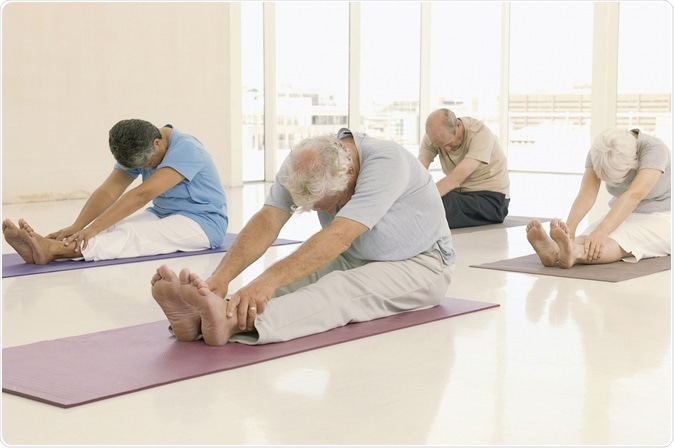According to a new study, walking or cycling or participating aerobic exercises at least three times a week can improve brain power among the elderly. Along with this regular healthy diet can also improve brain’s capacities and capabilities says the study. The study titled “Lifestyle and neurocognition in older adults with cognitive impairments: A randomized trial” was published in the latest issue of the journal Neurology.

Senior exercising at gym. Image Credit: PedroMatos / Shutterstock
Lead study author James Blumenthal, a clinical psychologist at Duke University explained that this regimen of regular exercise and a healthy diet improves the heart and cardiovascular health and with this improvement in “neurocognitive functioning” can also be seen. He said, “You're improving brain health at the same time as improving heart health.” Other experts have lauded this study and added that there are several benefits of a healthy diet and regular exercise. This study is the first randomized clinical trial that can prove the benefits of such regimens says Dr. Richard Isaacson, Director of the Alzheimer's Prevention Clinic at Weill Cornell Medicine. Isaacson was not part of this study.
Author Blumenthal has been working on long term effects and benefits of diet and exercise on not only physical but also mental health. He said, “I don't think there is another study that looked at the separate and combined effects of exercise and diet in slowing cognitive decline in patients who are vulnerable to develop dementia in later life.”
For this study the team included 160 adults who were suffering from high blood pressure or other heart disease risk factors. These adults never exercises and had some degree of cognitive impairment such as difficulty concentrating or remembering or making decisions. The average age of these individuals was 65 years and two thirds of them were females. There was equal representation from Caucasians as well as other ethnic and racial minorities. Individuals who had already been diagnosed with dementia or those who could not exercise due to physical incapacities were not included in the study. These participants were divided into four study groups and studied for 6 months.
The groups were;
- One group was put on the DASH diet or diet that prevents high blood pressure (Dietary Approaches to Stop Hypertension). DASH diet reduces salt and fat and sugar rich foods and increases fruits and vegetables and whole grains in diet. This group was not encouraged to exercise but was asked to adhere to the diet.
- The second group was asked to exercise regularly but their diet was not regulated. For the first three months these individuals did non-strenuous exercises thrice a week. This included a 10 minutes warm up and a 35 minutes of continuous walking or stationary cycling. For the next three months they exercised at home with periodic supervision
- The third group was asked to follow a regulated DASH diet and also made to exercise at least thrice a week.
- The fourth group received diet and exercise advice but was not asked to change their diet or exercise habits.
At the start of the study all individuals were given cognitive tests along with regular health assessment. At end of the study all health parameters were measured again.
Results showed that those who only exercised showed greater improvements in their executive functioning skills compared to those who did not exercise. Blumenthal said, “Remember, these are older adults who are completely sedentary and have verified cognitive impairments. We had no dropouts, and everyone was able to sustain the exercise program and do it on their own. That was great.” Benefits were greatest among the group that both exercised and followed a healthy diet. They averaged a 47 point improvement in their cognitive tests compared to 42 with those who only exercised and 38 who did neither. Brain aging was reversed by about 9 years in the combination group the authors write.
Longer term studies with larger number of participants could provide with greater insights into this say the researchers.